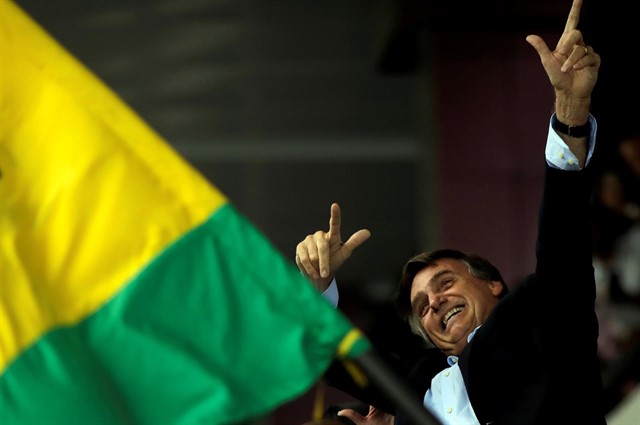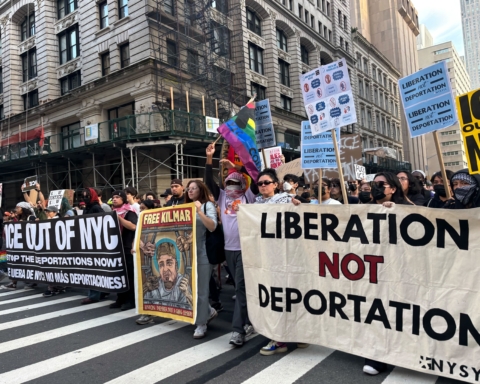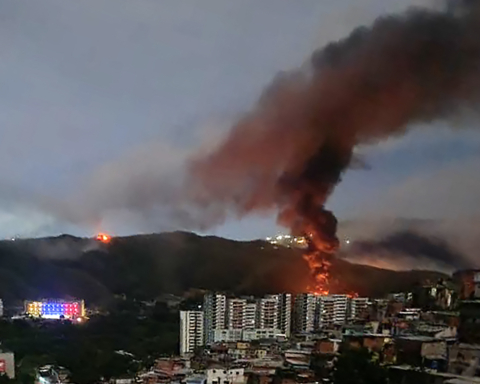According to Safatle, the unresolved legacy of the dictatorship and the Brazilian people’s resistance to the neoliberal program set the conditions in which the neoliberals decided that the only way to implement their policies is through authoritarianism. Bolsonaro’s no-campaign inaugurates a form of post-liberal politics, that occurs outside of public space and includes an unprecedented bombardment of fake news.
By João Soares for Deutsche Welle
Published October 9, 2018
DW: How can we explain the increasing adherence to authoritarianism?
Vladimir Safatle: No part of the current situation can be understood without making reference to what happened at the end of the military dictatorship. Brazil failed miserably to overcome its dictatorial past, which now comes back to shock us. No country in Latin America has such an explicit risk of militarization and even of a traditional form of coup as Brazil does. In none of the other countries do the Armed Forces have such a strong presence in everyday public life. This very clearly shows that the conciliatory solution produced by the transition in the direction of democracy was the greatest historical cowardice that the country had known.
That conciliatory step conserved sectors of the political class that were completely linked to the dictatorship, and preserved, in the heart of the Armed Forces, a mentality that justified situations of exception that now returns. It also preserved, in the core of civil society, a potential to support governments that are apparently strong and authoritative due to the fact that Brazil never imposed a duty of memory and transitional justice, which would have been fundamental in order to not see regressions like the one happening now.
DW: What role did the Constitution of 1988, which recently celebrated its 30th anniversary, play in this process?
VS: The Constitution of 1988 was the expression of that great conciliatory politics. It is often said that it is a citizens’ constitution, one that guarantees fundamental rights. On the one hand, it was a constitution without validity. To date, we have had 95 constitutional amendments, more or less three per year. Two thirds of Congress are needed to approve an amendment. In the Brazilian case, those negotiations last for months. One arrives to the very clear conclusion that the ever since the Constituent Assembly, the function of the National Congress has been simply to deconstruct the Constitution. It was born with that stamp.
Furthermore, 30 years later, there are constitutional laws that were never implemented because of the lack of supplementary laws. It is an aberration. The law establishing the tax on large fortunes is constitutional and was never implemented, because of the mere lack of supplementary laws. The constitution is born a dead language.
On the other hand, it was the result of a large structure of reconciliation among several sectors of Brazilian society, including those linked to military life. The military arrived with 28 closed paragraphs, practically forcing the constituent assembly to take them. Among them was the article that defines the role of the Armed Forces. In the Brazilian case, that includes the preservation of order, another total aberration because the function of the military is to defend the integrity of the national territory and that’s it. Then, what is exploding now is time bomb that nobody wanted to see coming.
DW: Is it possible to think about a Bolsonaro government according to the traditional models, making alliances in Congress to govern with the majority?
VS: Within a possible Bolsonaro government, several options are put on the table. Those depend greatly on the forms of resistance that occur. Now, it is important to remember a few things. The first is that Brazil is a sort of aberration from the point of view of neoliberal structural adjustment policies up to the present moment.
Due to the New Republic’s pacts, the conditions did not exist to advance much, nor to retreat. There were clearly constituted social forces that created a certain equilibrium. That made it so that the big neoliberal structural adjustments applied in other Latin American countries, like Argentina, did not occur here.
Brazil made it to 2018 with two of its largest companies being publicly owned, as well as two of the biggest banks. Additionally, it has a healthcare system that covers 207 million people and that is free and universal, something that no other country with over 100 million inhabitants has. There are also 57 completely free federal universities. They are not universities for the elite. Only at the University of Sao Paolo, 60% of the students come from families that earn up to ten minimum wages. The perception is that Brazil has reached the present in a very atypical situation from the point of view of neoliberalism.
The defenders of the neoliberal agenda understood that the only way to impose their reforms would be through authoritarianism, like in the Chilean model of Pinochet. It is a clearly authoritarian neoliberalism, different from that in Europe. There, the extreme right is anti-liberal and protectionist, incorporating certain social demands from the Left and using the struggle against the financial system in its discourse.
It is precisely for this reason that neoliberalism in Europe must be implemented by more centrist figures. That is not what is happening in Brazil. Even because polls show that 68% of the Brazilian population is against privatizations; 71% against reforming the labor law; and 85% against pension reforms.
DW: Would it therefore be impossible to adopt this agenda via electoral means?
VS: They only have one way of implementing it: hiding it, not letting it be clearly exposed or analyzed. The only way of doing so is to fuel and resuscitate the worst authoritarian ghosts of Brazilian society, placing them in the center of the political debate. All of these biased prejudices are fundamental pieces of a rhetorical strategy of nullifying the political space. What we saw was an anti-campaign, based on the emptying out of political space, through that type of provocation of vulnerable minorities – Blacks, women, LGBT people – that are mobilized, with complete justice, and that game ends up occupying the entire campaign scene.
On the one hand, a fascist potential that was more or less repressed won the right to exist and is flourishing very strongly. This goes back a long way. The military dictatorship had civilian support and the racist and prejudiced pattern of many sectors of Brazilian society is well known. On the other hand, there is a fundamental and absolutely stunning element: the campaign exits the public space and is displaced toward the virtual sphere, making it difficult for it to be shared among society. In that space, the continuous production of false images and videos that are able to forcefully interpellate people with their rhetoric, which can be shared, ended up setting the tone.
We saw what happened with the acts last Saturday [the mobilizations against Bolsonaro, with the slogan #EleNao]: large popular manifestations that occupied the streets of Brazil, and then were suddenly nullified. At the moment nobody knew exactly what had happened. Right after those protests, Bolsonaro had a jump in the polls. Then we started to understand. With an impressive organization, a vast, professionally constructed network of images, they sought to cancel out that protest by building a fake event in its place. They circulated photos that had nothing to do with those acts, with the clear objective of denigrating the protest’s proposals. They managed to cancel out a street event through a virtual mobilization.
These two elements constitute another model of campaigning that is completely outside of the traditional patterns of liberal democracy. Liberal democracy already has its limits, but it was obligated to preserve a public space in which society, as a whole, could operate an opposition. That element was brutally withdrawn. The candidate Bolsonaro was stabbed and then spent the entire rest of the campaign outside of that sphere. Each time his vicepresidential candidate or economist would make a declaration, they were catastrophic statements and immediately rejected. In other words, there wasn’t a campaign, in the traditional sense of the term.
DW: This election is already marked by the massive circulation of fake news and rejection of journalism. How is it possible to have debate if some groups are closed off to the discrepancies?
VS: Politics was never a question of argumentation. It is a mistake to think that. It is about the mobilization of affects that, in turn, express adherence to different and conflicting forms of life. You can’t argue against affects, rather you deconstitute them. It is a different process. However, affects are not irrational. They have their own dynamic and must be understood in their specificity. In a certain sense, in a technological situation like ours, anyone can produce fake news.
When it was only the sectors considered the press, there was a way of utilizing legal processes to react and know who had done it. In one way or another, a certain level was preserved, but even so, it is far from being something simple. There are various modes of constructing the news, constantly used by media groups. But now, there is a process in which this function is invisible: you don’t know who produced what.
The Bolsonaro campaign looked like a mess, amateur, something done in a hurry. But we started to notice that it wasn’t. It was extremely well organized, based on the quality of the material that it circulated. The materials that canceled out the protest against him, started to circulate hours after the acts and were extremely well produced. And I ask myself: Who was responsible? In what production company was it made?
We do not even know who Bolsonaro’s publicist is. Is it then that there was no campaign strategy or, in reality, is it being thought about in some other place that we cannot even see? Nothing adds up in this story. WhatsApp groups are organized with more than eight thousand people, that are connected with one another and that proliferate an enormous set of images that are extremely well edited by professionals.
DW: Political scientists tend to analyze the current political crisis starting with the 2014 election. But what is the relation between the current moment and the 2013 protests?
VS: It is a fundamental event in Brazilian history. The 2013 phenomenon was the best opportunity lost by the Left. It was a popular protest, that very clearly demonstrated the level of discontent, of social frustration, from the perspective of an enrichment that didn’t happen.
It could have been used by the Left to say: “We are prisoners trapped in a straitjacket in order to make a second cycle of policies of growth and redistribution of income occur. People need to take this up and fight against various political barriers” and things of that nature. But that was not done. The Left was afraid of the fact that the protests brought people to the streets who were willing to go even further, as well as the reactionary sectors of society.
Any popular manifestation convokes emergent subjects and reactionary ones. If you do not know how to give form to the emergent, the reactionaries take over the situation. That was what happened. A classic, literally. Marx showed this from 1848 when he tried to investigate how the proletarian revolution was lost, and transformed into the rise of Napolean the Third, by the blow of the 18th Brumaire.
The protests of 2013 show images of the people against power. Confronted with the images of people who went to break the National Congress and ended up setting fire to the Itamaraty Palace, you always have those who start to shout for “order.”
That’s what they started to do and thus 2014 arrived. After the election, I wrote in the newspaper Folha de S. Paolo That the polarization would not end the following week and was only going to deepen. That it was necessary to be prepared for that. That it was not going to help to imagine that the election was over and now everything would return to normalcy. But the government thought that was possible and it attempted to create a model of reconciliation. Along with the conservative sectors within the government, it demobilized its side, while the other side grew with the void, because there was no mobilization in response to them.
In a polarized society, the first thing you have to do is strengthen your pole, because the only possibility for survival is a sort of balance. You see that if you advance too much, the other also advances. But that was not done.
The Brazilian Left remained embalmed like a corpse, that is Lulism. It gave what it had to give, it didn’t give more. It is said that Lula would have 40% of the votes, and that’s true. If he were campaigning, he would win, that is clear.
That is why he had to be put in prison. Otherwise, he would be president again. But the fact that this would happen is due to a very rational logic of the population. The present is a catastrophe; the future, completely uncertain. Therefore, I want to return to the past, which was better. In fact, it was. This has nothing to do with the potential of transformation that Lula represents, but rather a situation of social terror. As a dynamic of transformation, Lulism is a corpse, even when it wins.







[…] before the first electoral round, Vladimir Safatler – Brazilian philosopher and teacher – analyzed his country’s conjuncture faced with the imminent elections polarized between the main candidates – the postfascist Jair […]